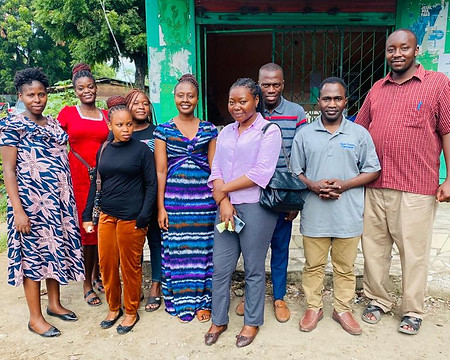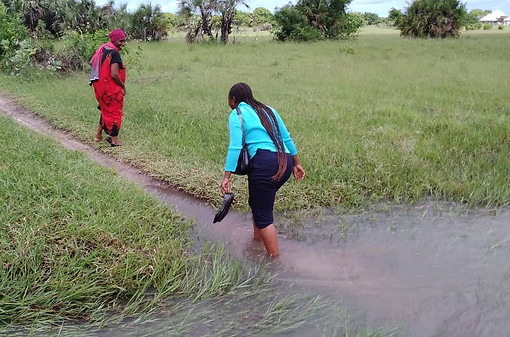FIELDWORK
March - April 2023
EHTZ Survey Fieldwork 2023
The EHTZ Survey Team, led by Innocent Pantaleo, Mogens Kamp Justesen and Herbert Hambati, conducted our extensive survey on giving practices in Tanzania this spring. This was done between March 28th to April 28th across three regions; Dar es Salaam, Morogoro and Kigoma. The team was joined by 13 enumerators from the University of Dar es Salaam – who together conducted 1380 households surveys across the regions. Our survey process in Dar es Salaam lasted almost 28 days, after which the team proceeded to the other two areas. Altogether 740 households participated in Dar es Salaam, 400 in Morogoro and 240 in Kigoma.

.jpg)
Mogens Kamp Justesen and Innocent Pantaleo guiding our team on our pilot day in Dar es Salaam.
Members of the survey team in the Kinondoni district in Dar es Salaam.


Innocent Pantaleo with the the Street Executive Office in Mtambani street in Ilala district, Dar es Salaam.
In Ilala Kota with (from left) Rosemary, Amanda, Sarah, Doroth, Karin, Jessica, Joshua, Kakira and Masue.


Accessibility challenges and assistance in Morogoro.
A survey of such scale and based on random sampling is no easy task, and our team was faced with accessibility challenges within the field. Accessibility of some enumeration areas was too challenging due to raining in Morogoro. To overcome the inaccessibility issues faced and ensure the safety of our team, few enumeration areas had to be changed to more accessible ones in Morogoro. Our team was supported by others in Morogoro. As EHTZ South Coordinator Herbert Hambati described: "We were studying everyday humanitarianism, but also received everyday humanitarianism throughout the process".
The team is now going through the extensive dataset, and we look forward to sharing our findings from the survey!
March 2023
Arusha workshop 2023
On the 20 – 24th of March our team gathered again to MSTCDC at Usa River for our annual workshop. A week of intense discussions allowed us to develop our collaboration as well as set clear goals for the next two years of our project. During the week we got up to date with the work of our three PhD students and shared different sets of work in progress, e.g. the corona crisis, shifting disaster management frameworks and localization.
PhD student Esther Mlingwa has been analyzing the Legal and Policy Developments on Disaster Management in Mainland Tanzania, placing a special emphasis on the Tanzania Disaster Management Act, 2022. This shifting legal landscape of Tanzania’s Disaster Management framework is also being examined collectively by the Disaster Management Cluster, which presented their work in progress on the relationships between transnational legal orders, politics and humanitarian giving within the context of the Kagera Earthquake of 2016.


Our team’s curiosity towards the politics of the Covid-19 pandemic in Tanzania continued this year. Consolata Sulley presented her exploratory work on the invisible hands of everyday humanitarian givers, focusing on women’s response to Covid-19 pandemic within local communities in Tanzania. The implications of the pandemic were also explored in Lisa Ann Richey’s research report on the corona crisis in Northern Tanzanian tourism sector.
The elites team has successfully moved forward with their work theorizing the south-south humanitarianism amongst Tanzanian elites, seeking to develop a new perspective on ‘localisation’ within the context of elite giving.


After the workshop Yvette Ruzibiza and Simon Turner travelled to Kigoma to continue their field work on the interaction and giving practices between Burundian refugees and their host communities. Others continued to Dar es Salaam to initiate the EHTZ survey work in Dar es Salaam.
We look forward to gathering at Usa River again next year!
February 2022
Arusha workshop 2022
After two years of patient waiting our team has finally succeeded in reuniting in beautiful Usa River. From the 28. of February until the 5. March, the EHTZ team spent an interesting week reminding ourselves of the milestones of the past couple years, reflecting on our work and goals, finetuning our methodology and planning our visions for the project for the next years.

Following celebrations of our team actually meeting in person, our day moved to important reflections and discussions on the challenges of aiming to decolonize a collaborative project during Covid-19, and with the new challenges it confronts us with in relation to data collection. Around lunch time we proceeded with updates from each individual work package and their current data collection, reflecting on past work within each work package and setting our minds towards our future research and the fieldwork that is to follow for each work package.


Our Tuesday 1.3. focused on reading draft papers presented by some of our work packages, and broader reflections on our project.


The development of our survey questionnaire was the main focus of Wednesday, led by our quantitive wizards Innocent Pantaleo and Mogens Kamp Justesen. In addition, we conducted an auto-ethnographic study led by Peter.
.jpeg)

On Thursday we were able to enjoy the presentations of our younger scholars, with each of our Tanzanian PhDs presenting their fantastic work thus far, with their interesting approaches, data, and reflections. The day was crowned with historical visits and dinner in beautiful Arusha.

The last day of our workshop we aimed to revisit some of the important themes from our previous days and plan our way forward for EHTZ. We also discussed our finalized plans for the coming fieldwork for each work package. The next morning we wished good luck to our colleagues heading to conduct their different fieldworks. Kwaherini!
Our different teams are currently conducting their fieldwork research around Tanzania, with elites team conducting interviews with the rich and famous in Dar es Salaam, Disaster team in Kagera and Refugees team in Kigoma.
March 2020 - January 2022
Data collection during COVID-19

A shot from an auto-ethnography conducted via Zoom for our paper on Covid-Organics and South-South Humanitarianism. Modality fits the theme!
Covid-19 certainly set new challenges for our team, but fieldwork and data collection continued by our EHTZ members in Tanzania and Denmark within restrictions for the period between February 2020 - February 2022. Fieldwork continued to be conducted by our Tanzanian team, whereas interviews of Tanzanian diaspora were held in Denmark. Furthermore, one of our collaborative methods for our paper Auto-ethnography acted as an important source of data for our paper South-South humanitarianism: The case of Covid-organics in Tanzania (2021)
February 2020
1st EHTZ Team fieldwork at Usa River
EHTZ Team has conducted fieldwork in different regions of Tanzania.
.png)
Members of EHTZ Tanzania Team conducting interviews and focus group discussions.
In the Kigoma Region, EHTZ has explored the concept of everyday humanitarianism within the context of the protracted refugee situation in the region.
_edited.jpg)
.png)
_edited.jpg)



